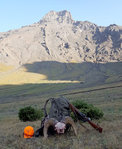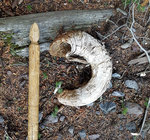Clear, 68° F
For most hunters, a bighorn ram tag is a once in a lifetime opportunity. Only about 180 licenses are issued in Wyoming each year. For those lucky enough to score a tag, the hunts are taken seriously.
…
This item is available in full to subscribers.
The Powell Tribune has expanded its online content. To continue reading, you will need to either log in to your subscriber account, or purchase a subscription.
If you are a current print subscriber, you can set up a free web account by clicking here.
If you already have a web account, but need to reset it, you can do so by clicking here.
If you would like to purchase a subscription click here.
Please log in to continue |
|



For most hunters, a bighorn ram tag is a once in a lifetime opportunity. Only about 180 licenses are issued in Wyoming each year. For those lucky enough to score a tag, the hunts are taken seriously.
But Eric Maichak may have unwittingly taken that to a new level.
Preparations
The day the Powell resident won the limited quota lottery in 2017, he began planning every detail of the hunt. He had months until he would ascend into the Absaroka Mountains, but he wouldn’t waste a minute.
Maichak identified and mapped the best place to find rams in unforgiving, isolated Hunt Area 2. But the scientist refused to leave anything to chance: He also considered natural springs and flat ground where he could make camp, and he mentally chewed over his kit, weapon, work schedule and physical conditioning.
Area 2 is filled with peaks and valleys. Even those eyeing the area from roadside overlooks find it hard to imagine easy passage.
Maichak spent days exploring the region by foot — making three trips into the mountains to become acquainted with the terrain — and questioned everyone he could find with experience. That included querying many at the Wyoming Game and Fish Department in Cody, where he works as habitat biologist, specializing in disease.
Maichak arranged for fellow redshirt Eric Shorma and Maichak’s fiance, along with their stock, to get him in to the Absarokas — and to help retrieve his trophy should his gun ring out in success. He worked hard at the range, obsessed with making 3-inch groups at 400 yards. A handmade staff made of strong lodgepole pine would help steady him both up and down the many peaks and valleys. While known for strength and endurance, he spent extra time at the gym in the haze of the early morning hours, strengthening his core and legs.
From a distance, the jagged peaks look solid, but in reality, they are covered in loose scree.
“It’s like walking on marbles,” Maichak said. “It’s crumbly, eroded stuff.”
Luckily, Maichak is sure footed and made for endurance.
“He’s a goat,” said Andrea Barnhardt Davidson Maichak, a regional recreation planner for the U.S. Forest Service and Eric’s now-bride.
Alone at 11,000 feet
When the big day finally arrived, changing work obligations prevented both Shorma and then-Davidson from assisting. Maichak would have to move forward on foot and alone, or concede defeat. His only contact with the outside world would be other hunters and a loaned locator beacon. At the end of the day, he would push one button on the beacon to signal his location and assure his friends he was OK. Another button would signal success, calling in his friends and stock to help him descend with a ram. A few more buttons would signal distress in varying degrees.
Maichak had hoped for success on the first day of the hunt. Instead, he ended the day by popping his Thermarest — an insulating air-filled sleep pad that had been the only barrier between him and the cold, hard ground.
A hunt party arrived on horseback near his camp that day and he decided to move, seeking more isolation. Glassing the terrain, he saw an irresistible area to the west. It meant another long hike down a game trail — 1,000 feet deep and easily traversed by only goats and sheep — and then back up the other side and down into the basin. He made the long hike, set up camp in the new area and continued the hunt at more than 11,000 feet of elevation.
Three more days of hard hunting passed. Maichak’s food supplies dwindled, along with his confidence. While his body adequately absorbed the pounding, frustration grew. Not only was his sleep pad unrepairable, leading to restless nights, he also had to deal with thick smoke from nearby Montana wildfires.
But then he saw a group of rams. Attempting to anticipate their path, Maichak scrambled for hours to get into position, carefully picking his way along the cliffs.
“They were a mile away and working their way toward me,” he said. “I assumed they would take the high path.”
He was wrong. The bachelors took the lower path and a full day among the cliffs ended in more frustration.
Taking the shot
On day five, he decided to pack some extra water, leave camp and sleep in an adjacent basin. After a night spent on a “soft spot” in the rocks, Maichak climbed out the following morning, taking his time to ensure he didn’t spook his game. It was then that he noticed movement above; it was a ram. Glassing around, he saw others. One, he said, was “a good one.”
The wind was right, and Maichak had a steady shot in the prone position. Though it wasn’t the biggest ram he had ever seen, Maichak remembered some advice he received from Shorma: “If it’s big enough to shoot on the last day, it’s big enough to take on the first day.”
A shot from Maichak’s trusty .243 rifle rang out — echoing through the cliffs. The horror stories of people who have shot, assumed their harvest was in hand, and then watched as they got away was bouncing around in his head. In taking a second shot, he followed advice from a game warden friend: “Shoot until they don’t move. You’re never going to get another chance.”
Maichak hit the “sheep down” button on his locator beacon and merrily went about boning out his trophy. He took his time dressing the ram, making sure even small bites of the resource weren’t wasted.
He was also vigilant, wary of grizzly bears or other predators rushing to the smell of fresh meat, and glassing for signs of friends on horseback. But he saw neither.
After carefully packing the 60 pounds of meat, he started the mile and a half hike back to camp, 1,500 feet below. Success made his relatively short trip easier, despite the extra weight of the meat on his back, another 30- to 40-pounds of head and horns in one hand and his humble stick in the other.
“I couldn’t have made it with out my staff,” Maichak said.
Six hours after pulling the trigger, he arrived back at camp, surprised to find he was still alone. As the day began to fade, he settled in for a sleepless night and sent another tranmission on his beacon, requesting extraction.
The elation of the harvest was wearing off and exhaustion was setting in. Yet, he kept his eyes open and his bear repellent in hand that night, ready to defend himself if needed.
“Fairy tales of bears running to gunshots invaded the mind,” Maichak would later pen in a journal entry.
Fears of an invasion during the night proved unfounded, but by the time first light comforted him, Maichak was confused to still be alone, wondering if anyone was coming to the rescue. After making coffee, he decided to begin his hike back to the truck.
The long trip home
There was only one way in — by horse or by foot — so he figured he’d meet his friends early in the hike. He guessed the more than 3,500-foot descent back to his Toyota would take at least 12 hours with the weight of his trophy in tow, but hoped for relief.
None came.
As he trudged back to civilization, he came to a hole, possibly excavated by a grizzly. He couldn’t help but notice the smell of blood and gathering flies as the overhead sun heated his pack. The further he trekked, the more narrow his view became. He took occasional breaks, becoming more concerned about being surprised by a bear on the path. His muscles burned and the meat and gear on his back and head in his hands seemed to grow exponentially heavier with each step.
“There was less than a sip of water left in [my] bottle,” Maichak said. “It wasn’t fun anymore.”
He pressed forward through the pain, never doubting he could endure the torture, but wanting the hike to be over. After nearly 12 hours, he finally could see his truck.
He put his pack in the bed of the truck and took a seat on his tailgate.
Maichak sat there for a while, “listening to the river,” then put his key in the ignition and made his way down the two-track trail out of the mountains and toward home. By the time he made it to pavement, Maichak was able to reach Shorma by phone. After a short talk, he realized he had been pushing the wrong button for extraction. His pain subsided, replaced with a blank stare at the road ahead and a bit of embarrassment.
“It was operator error,” Maichak said with a sheepish grin.
Through it all, Maichak never thought about quitting. He’s had hard hunts in the past and plenty of experience alone in the mountains. But knowing this was a once in a lifetime chance kept him going, pushing himself beyond the point of no return to make it home to share the unique taste of Wyoming’s bighorn sheep.